Before determining the right keywords for an article, keyword research needs to be done. Fortunately, many keyword tools can help you do your research more effectively.
With the keyword tools, you can quickly find keywords relevant to readers’ needs.
As a result, your articles will be more easily marked by Google as SEO Friendly and placed at the top of search results. You want, right?
You don’t need to be confused about which keyword tools to use; we have summarized the best keyword tools you can try.
11+ Best Free Keyword Tools!
Good keyword tools should help your SEO efforts, significantly improving the quality of the content (On Page SEO).
Here are the 12 keyword tools recommendations that have these criteria:
1. Google Search

Google search is the most straightforward and easiest-to-use keyword tool. Why is that?
The reason is that Google Search can instantly provide keyword recommendations related to your search.
You’re looking for the keyword “hosting Indonesia” in Google Search. Then a dropdown of several derived keywords will appear below:
By looking at the long tail keyword recommendations or derived keywords displayed, you will know what information is needed and the most sought after by Google users about the topic.
This is what you can then turn into content ideas.
There are tips for you. Do a Google search with incognito or guest window mode. The goal is to keep search results accurate without being influenced by your previous search history.
2. Google Trends
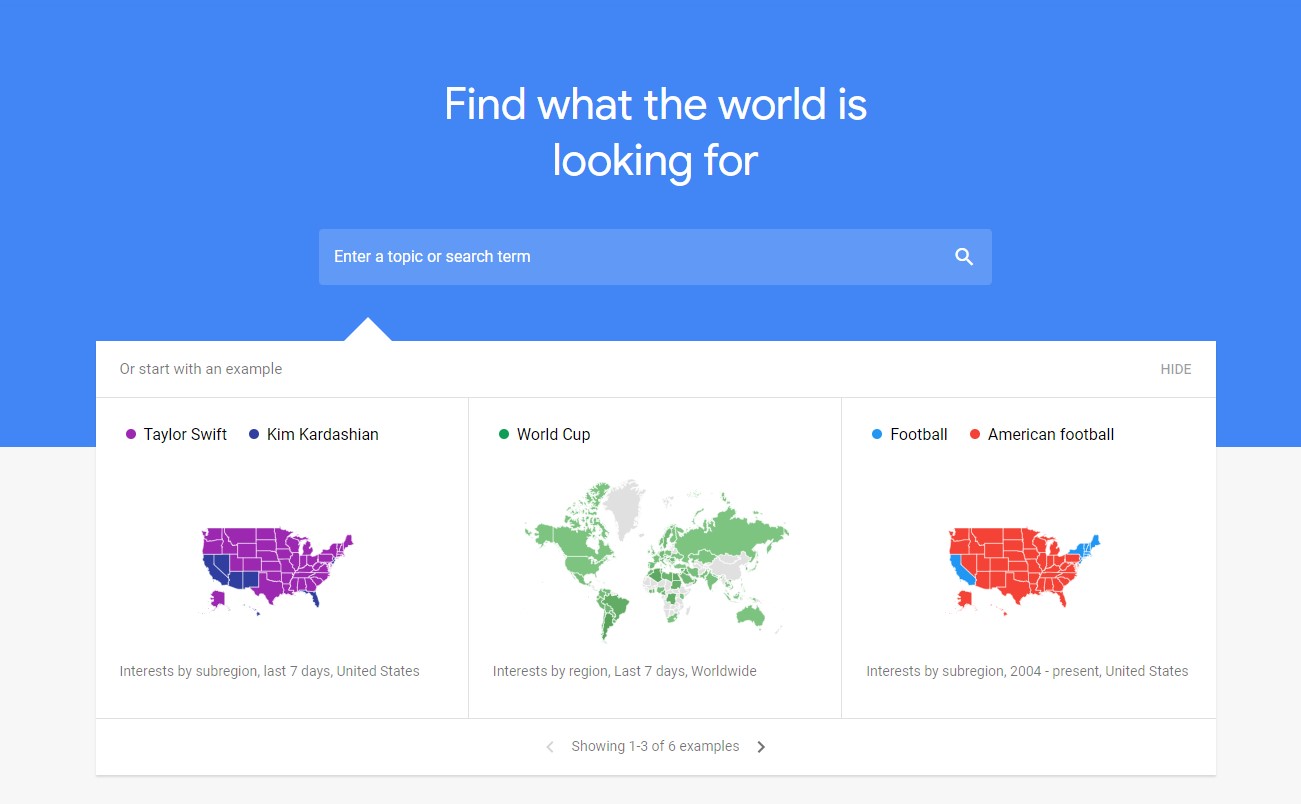
Google Trends is a platform made by Google that can do keyword research. This keyword research tool will help you find out the search trends at any given time.
Whether you’re a blogger, a marketer, or something else, Google Trends can help you find the best keywords for your content. This tool can access data obtained from real-time Google search results.
This platform is one of the free keyword tools that is widely used because of its various advantages, namely:
- Has a search filter by region
- Displays a list of hot topics
- Showing the development of a topic from year to year
- Has easy-to-use features and navigation
- Provide keywords relevant to the topic.
- Can compare multiple keywords at once.
- Can display keyword data from the web, Google Image, Google News, Google Shopping, to YouTube.
With the advantages of Google Trends above, you can measure which keywords have high search rates or are suitable for specific regions. Next, you need to decide which keywords to use.
3. Google Keyword Planner
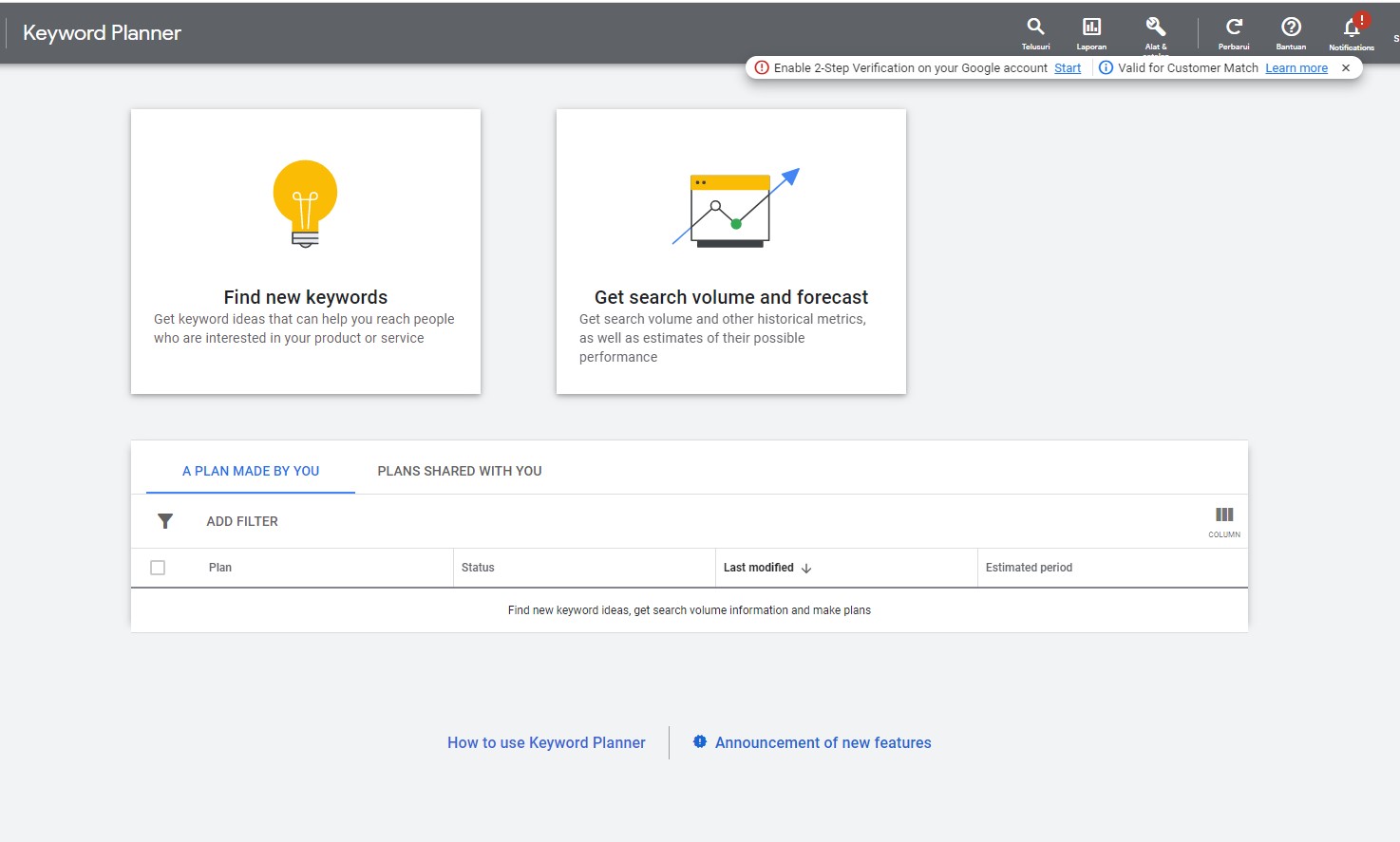
Like other keyword research tools from Google, Google Keyword Planner can help you get the right keywords thanks to accurate data from Google.
This tool can also search for keywords for ads as part of the Google Ads service.
This tool is quite effective for targeting keywords with SEO purposes in the organic realm, for example, to create blog articles.
In addition, this tool also supports keyword research for businesses. For example, look for keyword ads (ads) that support conversion rates.
In Google Keyword Planner, there are two main features: Discover New Keywords and Get Search Volume and Forecast.
With the Discover New Keywords feature, you can search up to 10 related keywords simultaneously. Or you can also search for keywords relevant to your domain or website.
In addition, you can know the level of keyword search and competition to be number one in the search results.
Meanwhile, using the Get Search Volume and Forecast feature will give you specific information about paid search and keyword performance.
That way, you can map out your keyword ads strategy so that the target can be achieved.
The following is the detailed information that you will get in each feature:
| Discover New Keywords | Get Search Volume and Forecast |
| Looking for keywords in two ways, namely entering the target keyword and the website address. | Contains keyword forecast data and historical metrics. |
Includes basic information, such as:
|
The forecast table contains the performance of keywords:
|
| Can store multiple keywords in one group. | Estimated keyword performance for the following year. |
| Refine keywords feature or filter brand and non-brand search keywords, or keywords that other people also search. | Filter performance of keywords based on search devices, such as desktop, tablet, and mobile. |
| Search keyword search filters by location, which can be matched against other factors, such as conversions, clicks, advertising costs, etc. |
With a lot of information provided, Google Keyword Planner can help you estimate which keywords are potential to use.
However, it would be best not to rely on Google Keyword Planner alone and use other keyword tools to get maximum research results.
4. Google Search Console
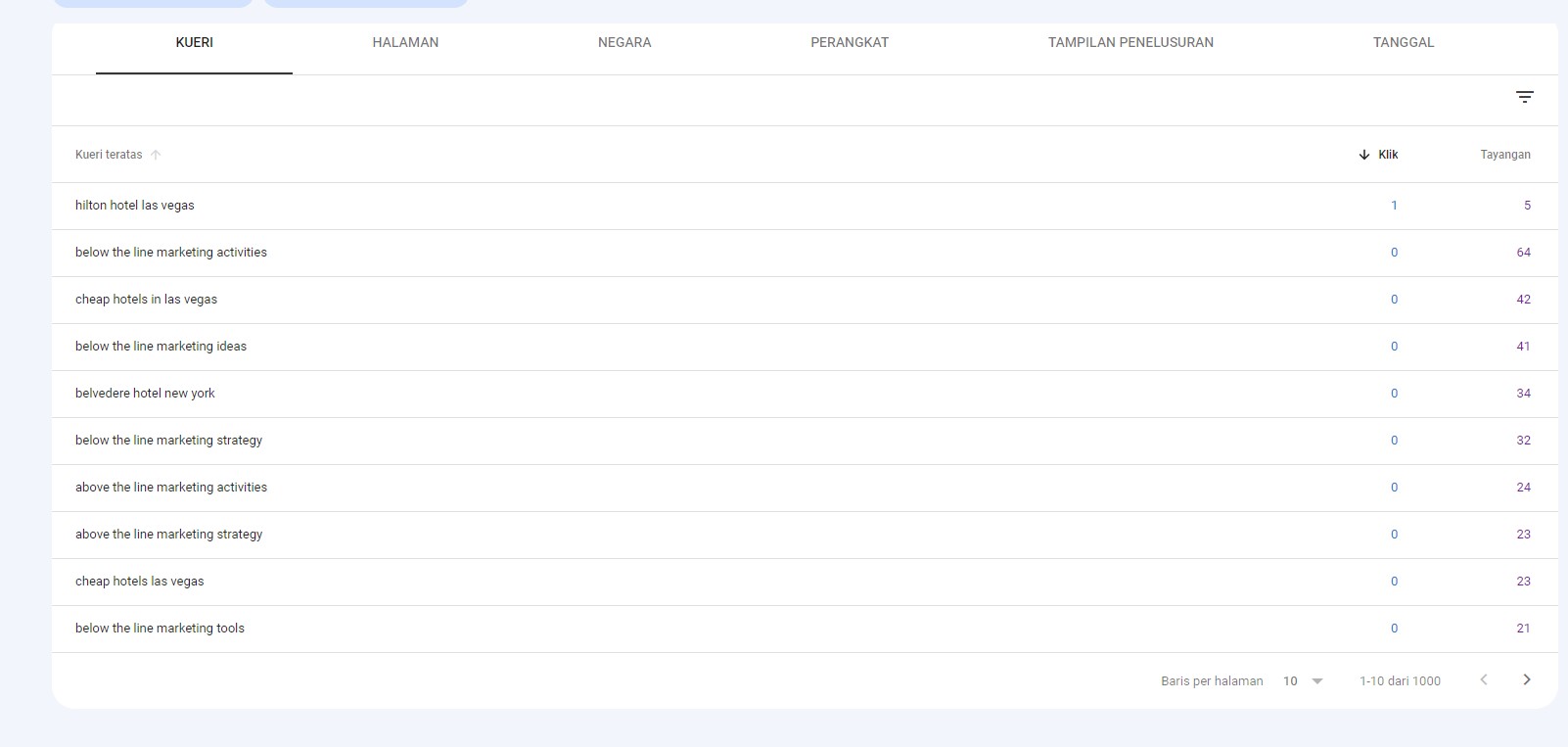
Google Search Console is a free tool released by Google to monitor website performance and is quite effective for keyword research.
With this tool, you can view keyword performance reports on all content. For example, how many clicks the content generates on each keyword, see the position of the content keywords in search engines, and others.
Google Search Console is also easy to use. This keyword tool can be integrated with your WordPress website for easy monitoring.
You will find the entire report provided by Google Search Console on the Performance tab. And for keyword research, you only need to access Queries.
In Queries, there is a list of keywords that you use, complete with information in the form of:
- Number of clicks to the website.
- impression.
- CTR.
- The average position of your website in search results.
With this data, you can measure the effectiveness and performance of the keywords used. You can also find new keywords for content ideas.
You can also take advantage of filters—for example, filter by position in search results. Although simple, this feature can filter out which keywords have less than optimal performance and must be optimized.
5. Keywordtool.io
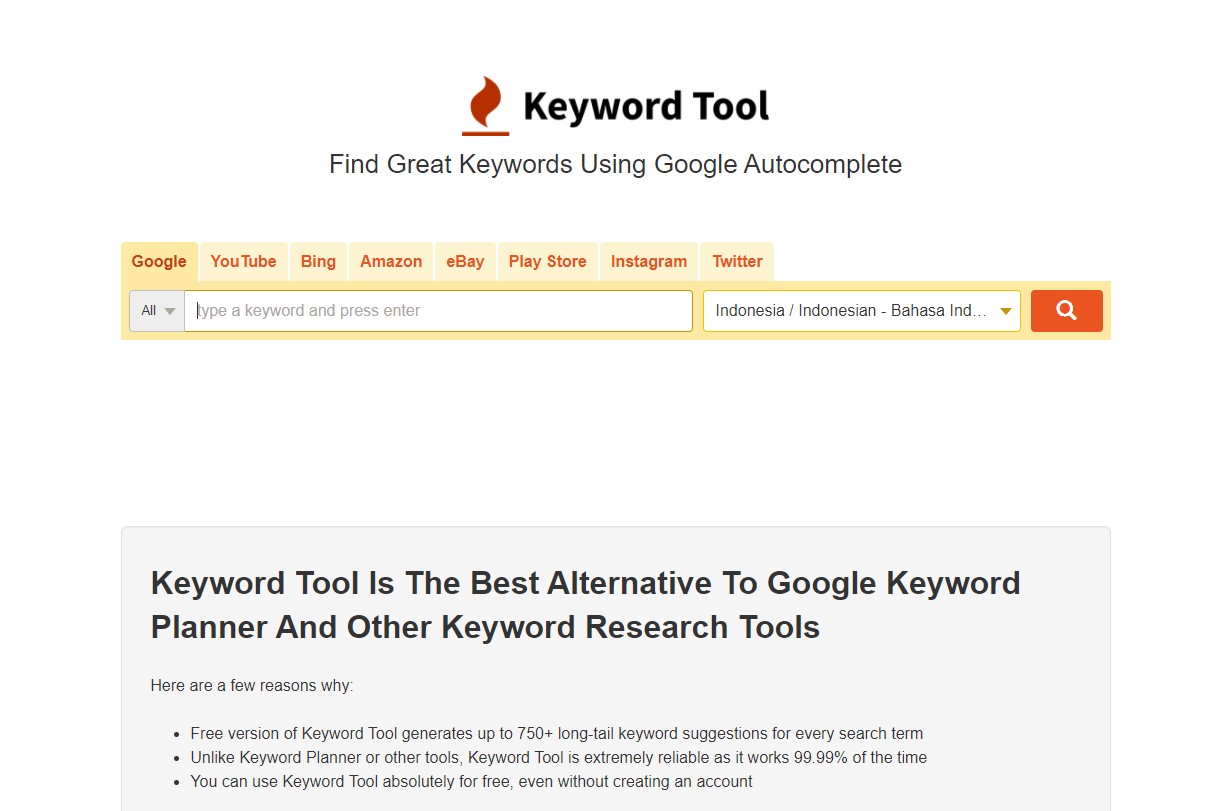
As the name suggests, Keywordtool.io is a keyword research tool to help you find new ideas.
You don’t need to worry about using this tool. This is because all the data displayed uses resources from Google.
No wonder Keywordtool.io can provide long-tail keyword results that are complete and relevant to user searches.
Then, what are the advantages of this keyword research tool? Ability to find keywords that need to be visible to Google Keyword Planner.
That’s why big agencies like Uber, Philips, Harvard University, etc, trust this tool.
The research results provided by keywordtool.io are not just Google searches. But also other platforms such as YouTube, Bing, Amazon, eBay, Play Store, Instagram, and Twitter.
Various content formats can be checked: website content, images, videos, and news. A location filter is also provided if you want more specific research results.
When searching for a keyword, the tool will automatically display a research table containing a collection of relevant keywords, like this:
Well, each keyword is equipped with information such as:
- Search volume or keyword search volume.
- Trend or keyword search statistics.
- Cost-Per-Click (CPC) or the estimated cost of advertising in Google Ads.
- Competition score or difficulty level wins in the top ranking.
Essential information such as volume and difficulty level can help your content match the targeted keywords better.
Meanwhile, trend information makes it easy to find statistics on keyword performance in the last year.
Keywordtool.io lets you view up to 750+ long tail keywords for each keyword with short information.
Suppose you want complete information and excellent features such as competitor analysis, search volume, and more detailed CPC data. In that case, paid options range from 69 US Dollars to 159 US Dollars per month.
6. Ubersuggest
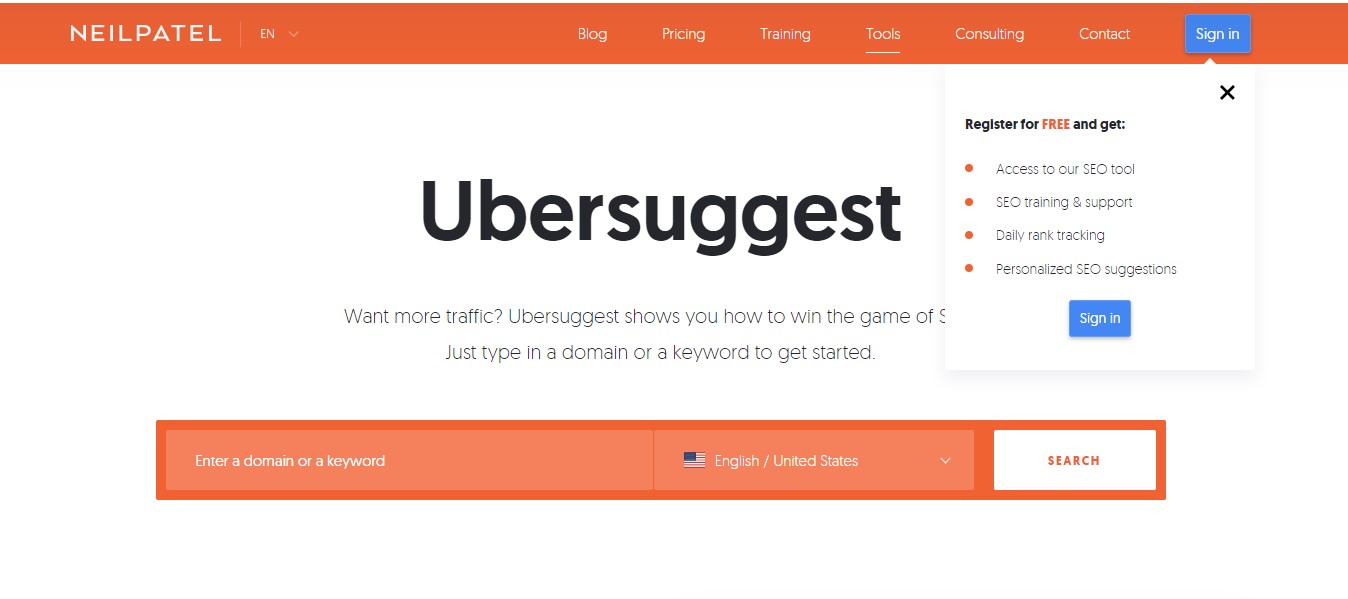
In the world of SEO, you may already be familiar with the name Ubersuggest. This tool has one of the excellent features for keyword research, namely Keyword Analyzer.
Uber suggests Keyword Analyzer itself has four main features, namely:
- Keyword Overview
- Keyword Ideas
- Keyword List
- Content Ideas
To use Ubersuggest, you only need to type in your target keyword and set the location filter. Then, you will be directed to the Keyword Overview page, which contains the following information:
- Search volume or the number of searches for a particular keyword in a month
- SEO difficulty or competition level for your target keywords
- Estimated paid search competition
- Average CPC
- Historical data statistics on keyword development within one year
- Comparison of search results from desktop and mobile
- Number of keyword clicks from SEO results
- Up to the average age of a keyword searcher
When you scroll down, you’ll find Keyword Ideas, which display a list of keywords relevant to the keywords you’re looking for.
The information includes search volume, CPC paid, and SEO difficulty. So, you can strategize what keywords still have potential and see how much competition there is.
Like the example above, from the keyword “digital marketing,” it can be seen that Ubersuggest provides 11 top keyword recommendations, 4,983 relevant keywords, and accurate time search results dropdowns on Google.
With this data, you can measure keyword search performance, find out who your rival websites are, what alternative keywords are to get top rankings, etc.
Next, there is the Content Ideas feature. You will get a list of content that uses the keywords you are looking for.
The information provided is quite complete, namely:
- Content title
- Website URL
- Estimated visit
- Number of backlinks
- Number of shares on social media
You can use this information to design content relevant to readers and better than competitors.
Ubersuggest also provides a new feature, namely Keyword Lists. You can save your target keywords; research is even more organized with a complete data set on one page.
Ubersuggest’s Keyword Analyzer is free to use but with some limitations. However, you need to subscribe to the paid version to access the Keyword Lists feature.
You can subscribe to Ubersuggest from USD 12 to USD 40 per month to access all the keyword research results in the tool.
7. Ahrefs Free Keyword Generator
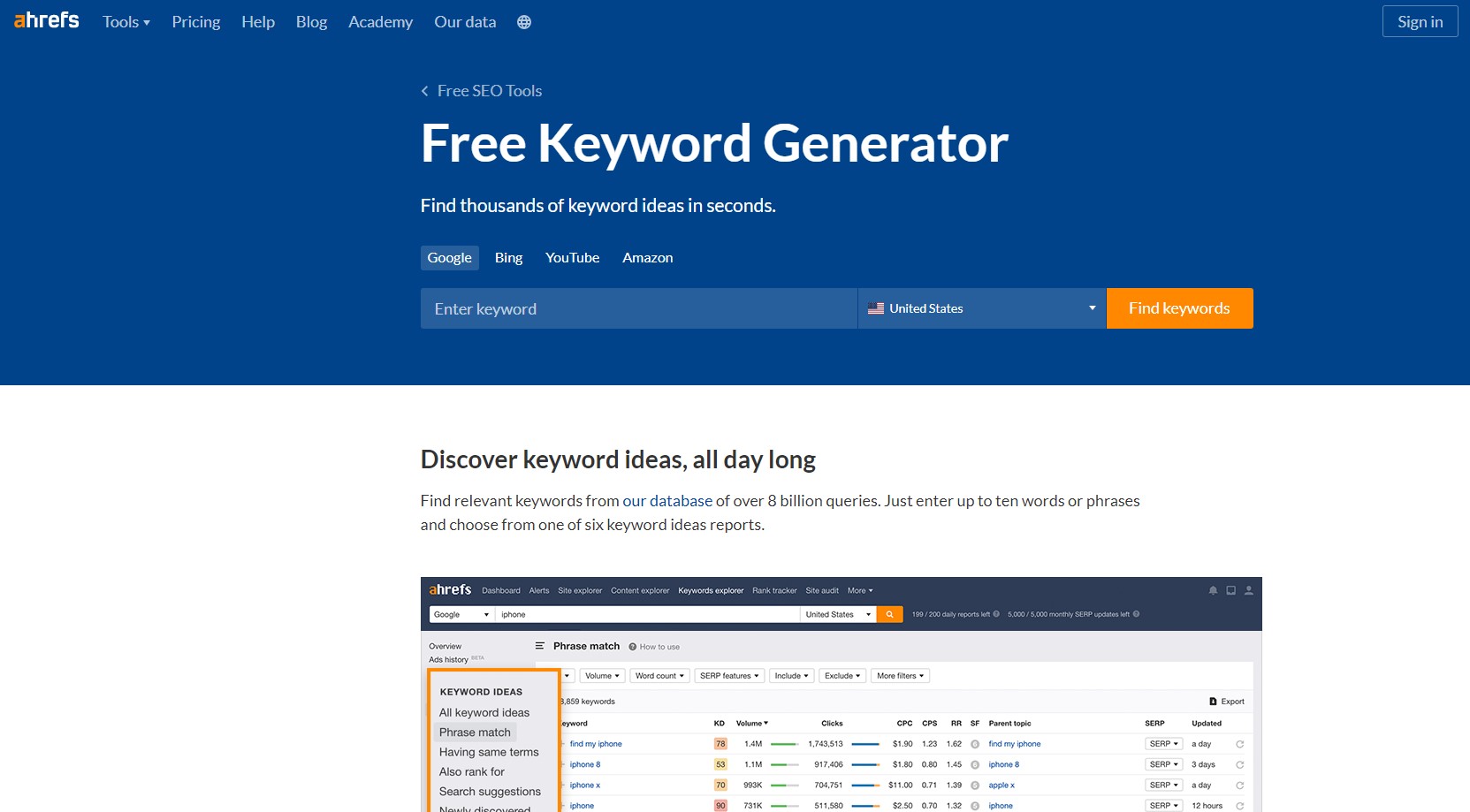
Ahrefs is a complete SEO tool that offers premium features. However, Ahrefs has a Free Keyword Generator as a free keyword tool that you can try.
As a keyword tool, Ahrefs allows you to search for new ideas, view SEO performance metrics for specific keywords, identify long tail keywords, analyze competitors, and more.
However, the information displayed in the free version still needs to be improved. Ahrefs will only provide 100 relevant keywords, keyword difficulty, search volume, and the last time the keyword was updated.
Meanwhile, analytical data on the Pro account will provide more complete results such as:
- Matching terms – Displays keyword ideas that contain your keywords
- Related terms – Match related keywords
- Search suggestions – Report keyword suggestions on targeted keywords
You must pay from USD 99 to USD 999 to access the complete data.
8. Wordtracker
![]()
Want a keyword tool with a simple and intuitive interface? Try Wordtracker first.
By typing keywords in the Wordtracker search box, you will get the primary data as follows:
You will instantly receive information on the search volume, level of competition, and search trends for that keyword.
In fact, at the same time, you will get other relevant keyword information. For example, in the example above, SEO is a website with SEO, SEO marketing, SEO as a service, and others.
Eits not only that, but Wordtracker also proves to be intuitive because on the same page, you can:
- Sorting out keyword suggestions that are still related to the keywords you are looking for
- Has location filters for more targeted searches
- Use the keyword import feature, if you already have a keyword file to search for
- Using the export or download feature of keyword research data so that research can run even offline
- Make a list of target keywords
- Entering specific keywords with include keywords
- Exclude keywords with exclude keywords
In addition, Wordtracker claims to be more than just a keyword tool; it’s a market research tool. Wordtracker can also research business needs, such as Ads, PPC, and others.
Just like Google Keyword Planner, Wordtracker also simultaneously presents keyword data in the context of paid search and SEO. However, some differences make this keyword tool superior:
Well, to see keyword data for both PPC and SEO, Wordtracker provides a toggle that you can choose from. That way, you will get two keyword data in one page at once, thus speeding up the research process.
In addition, Wordtracker also provides keyword performance statistics in the historical column. When clicked, a specific pop-up box shows the URL’s ranking in the past year.
Uniquely, you can manually set the limit for each data, making it easier to research keywords as needed. For example, you can search for keywords with moderate competition or a search volume above 1000, and so on.
The free version of Wordtracker allows you to search ten times for keywords, with the results of 50 relevant keywords displayed. The rest can only be accessed with paid accounts, ranging from USD 27 to USD 99.
9. KWFinder
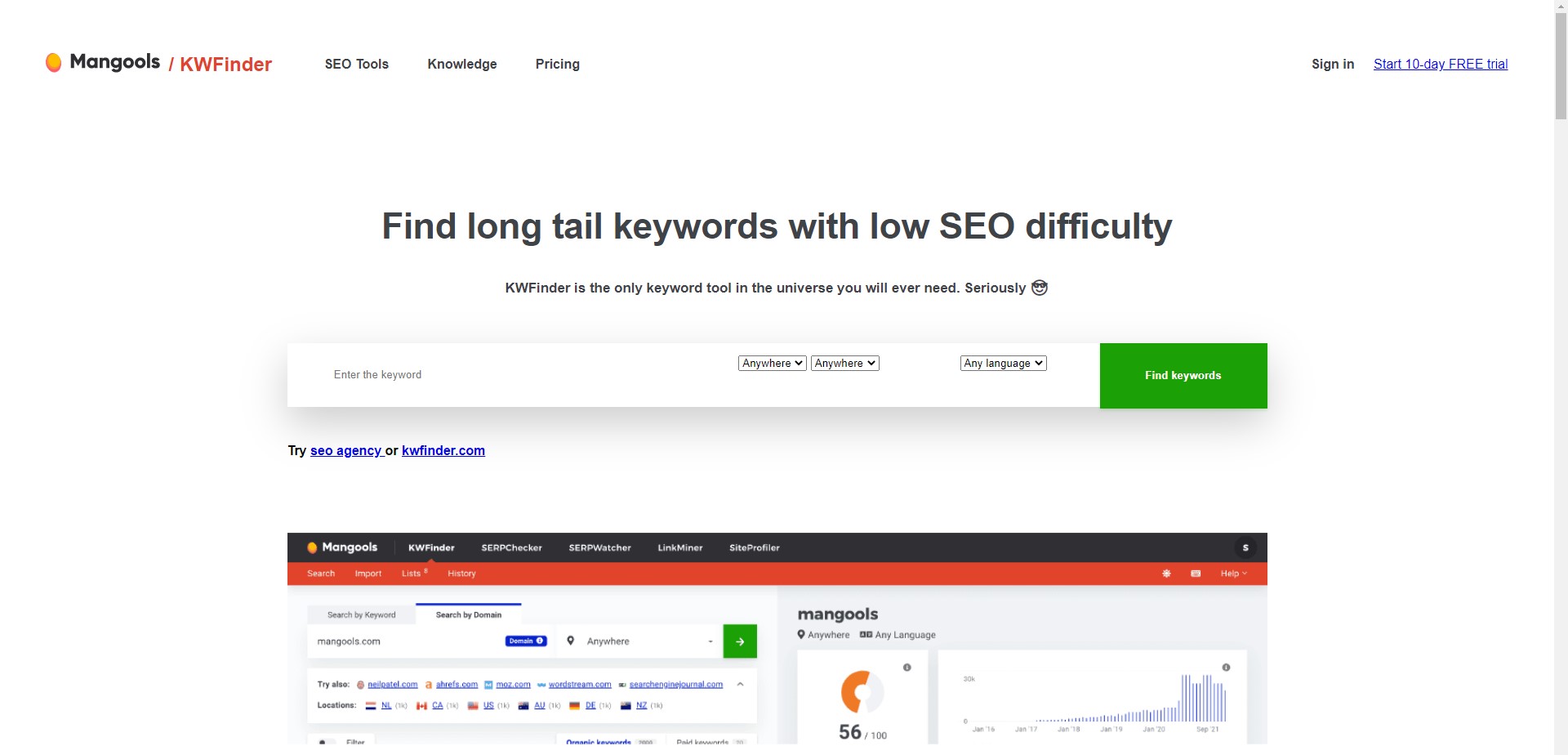
Since its appearance in 2014, KWFinder has continued to grow to become one of the keyword tools with high accuracy. Not surprisingly, this tool is a mainstay by various large companies. Call it Airbnb, Adidas, Alexa, and others.
KWFinder is a Mangools keyword tool (SEO tool) that can:
- Identifying potential keywords with a database of 2.5 billion keywords
- Check competitor keywords that rank in search engines
- Display search volume in historical statistics
- Provide information about local keywords and SERP analysis
To research, you can enter keywords or domains in the KWFinder search box and specify the search location. Could you ensure you already have an account that can be created for free?
With the keyword “search engine optimization” example above, you will get two metric results: a table of relevant keywords and a SERP overview.
The SERP Overview includes a search volume analysis of the keywords you searched for in the last six years. In this example, the volume of search engine optimization is 2900.
Furthermore, you will know that the difficulty level of the keyword above is 28, which means it is relatively easy. And you’ll find examples of top-ranking content complete with information:
- Domain Authority
- Page Authority
- Backlinks
- Share social media
In addition, you will get related keyword information; you can measure keyword strength with information such as:
- Trend – Keyword search volume in the past year.
- Search – Average number of searches per month; you can choose a data range between 12 months, six months, or three months.
- CPC – Estimated bid (cost per click) in Google Ads, which can convert currency to IDR.
- PPC – Level of competition in PPC (pay per click) in Google Ads.
- KD – Difficulty level for ranking on that keyword. Calculated based on the strength profile of the URL on the first rank.
For those of you who are focused on SEO efforts, it is enough to pay attention to the search volume statistics on each relevant keyword and trend so that you can:
- See which keywords are potential in the long term.
- Define seasonal or seasonal keywords.
- Read which keywords have decreased.
Meanwhile, for those who want to research keywords for advertising, you can pay attention to the CPC and PPC information on each related keyword that appears.
Want to feel the experience of keyword research with this tool? You’ll need to create an account first. KWFinder provides a 10-day free trial with limited daily usage.
You can upgrade to a paid subscription if you want more detailed data. This keyword tool sets monthly prices ranging from USD 29.90 to USD 79.90.
10. SEMrush Keyword Tool

SEMrush, an old player in the world of SEO tools, also has several features supporting keyword research. One of the main ones is the Keyword Magic Tool.
You only need to type in the desired keywords, set the location filter, and get the following data:
In the table of research results, there are several data containing:
- Search volume
- Trending keywords
- Keyword difficulty
- Estimated CPC in USD
- PPC competition forecast
- SERP features, such as snippets, knowledge panels, site links, reviews, video carousels, and more
- Number of URLs with these keywords
Want to filter for more specific keywords? Use advanced keywords or filters, including word count, competition, SERP features, and SERP results.
In addition, SEMrush also displays specific data for each keyword, as below:
With this data, you can see competitor content with the exact keywords and create better content.
As a keyword tool, the accessible version of SEMrush is enough to help with keyword research.
However, if you need more than the keyword tool features, several paid subscription plans exist. They are starting from USD 119.95 to USD 449.95 per month.
11. Soovle
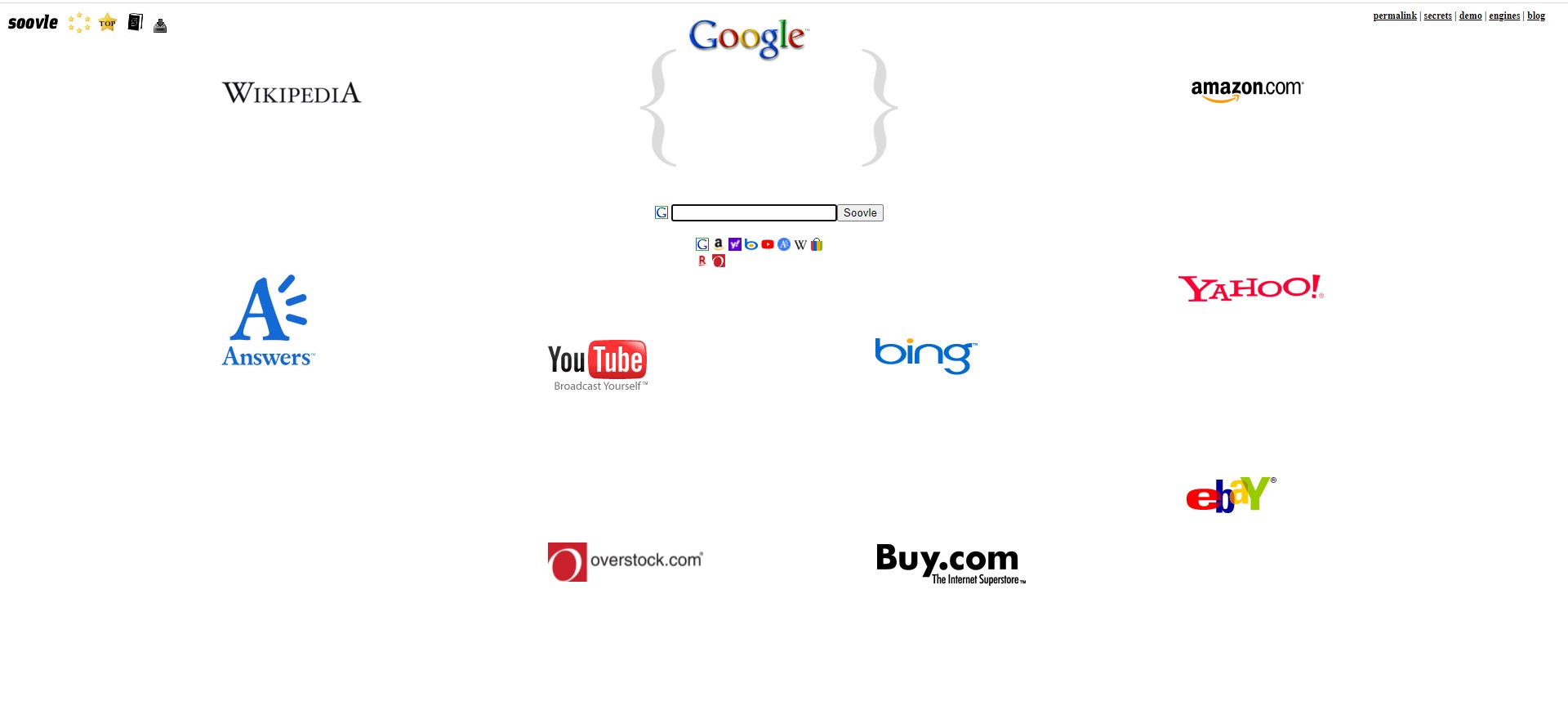
The next mainstay keyword tool is Soovle. This tool can help you search for keywords from multiple platforms simultaneously. There are at least seven platforms, namely:
- Google;
- Amazons;
- Yahoo;
- Bing;
- YouTube;
- Answers;
- Wikipedia.
When typing a keyword in the search box, Soovle automatically collects the relevant and most searched keywords on each platform, as in the example below:
If you optimize keywords across different platforms, Soovle is quite effective for you to use. The reason is, with this tool, you can feel several benefits, namely:
- Can perform keyword searches simultaneously on several platforms in real time and quickly.
- Can compare which keywords have the most potential on each platform
- Measures how many keyword searches are on each platform.
- Can devise different SEO strategies according to platform keywords.
- Bringing up the top long tail keywords on each platform in real-time.
In addition, there are several other features that you can take advantage of—for example, sending automatic keyword data to email, printing keyword data, saving on the Soovle web, or seeing keyword performance on Google Trends.
However, it seems that Soovle still has some drawbacks, such as:
- Not too many keyword results
- The information provided is less complete, such as search volume, search trends, competition, and others
- Provide only raw information in the form of relevant keywords along with SERP results
- Does not provide a location filter, so the keyword results obtained are less specific
This tool is suitable for you to use in the early stages of keyword research. For example, you are looking for keyword ideas, seeing potential long-tail keywords, and others.
12. WordStream
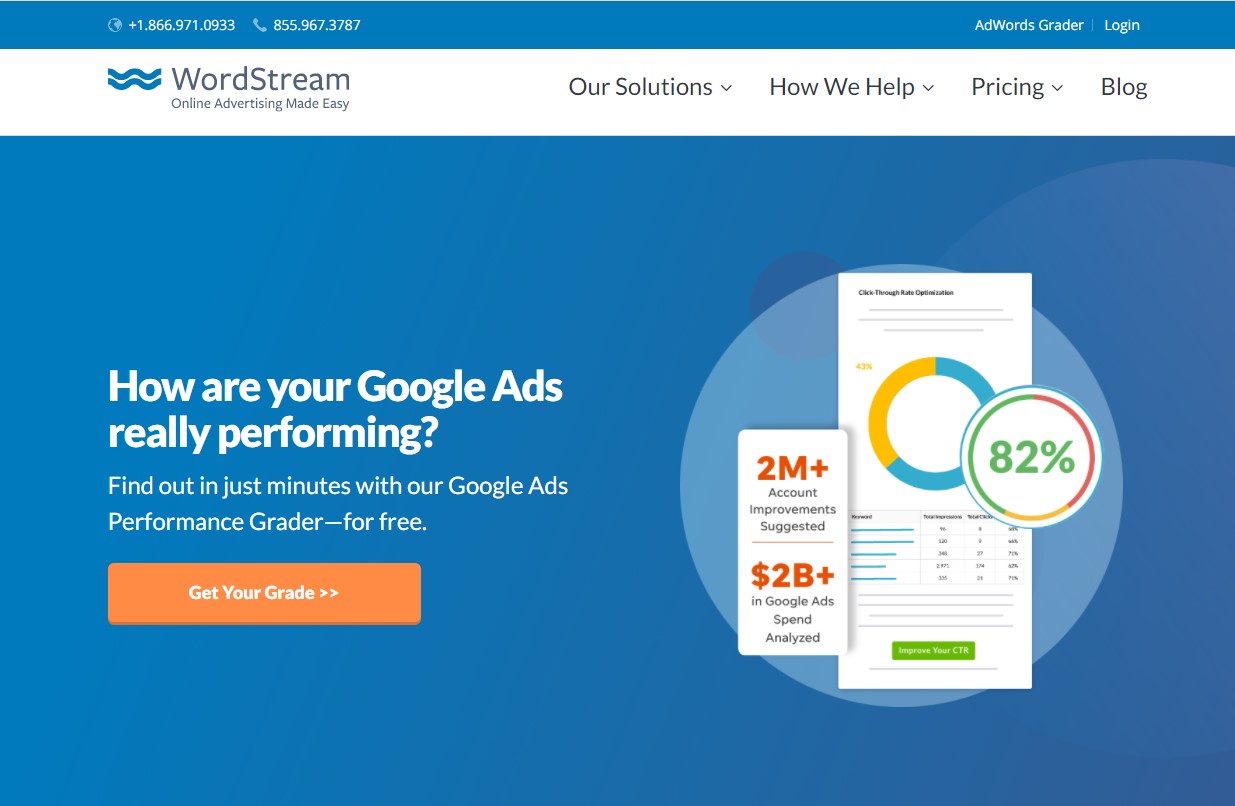
The last keyword tool to consider is WordStream. This tool suits those of you who need keyword research, especially for Ads needs.
One of the things that this keyword tool excels at is its ease of use; it only takes three steps, namely:
- Search for new keywords.
- Keyword analysis.
- Upload the keyword list to Google Ads.
In the main search field, you can search for keywords and URLs equipped with domain and location industry filters.
For example, when entering your business URL, the research results will specifically display up to 500 relevant keywords.
Well, you can also do this technique to see competitor keywords. Just enter a competitor’s URL, and you have a potential keyword.
As an alternative to Google Keyword Planner, this tool displays fairly complete information regarding paid search. The report contains search volume, estimated CPC, and level of keyword competition.
Another trick you can do is to input a competitor’s domain into a WordStream search and volley! You can peek at what competitors use keywords.
You can see the top 25 keywords on the WordStream page for the website version. If you want to access keywords in full, you can send them automatically to email.
In one download, you will be given two files. The Excel document contains keywords and complete instructions for uploading the file to Google Ads.
The good news is that all of WordStream’s features are free. Good, to help with keyword research?
Which Keyword Tool is Your Choice?
The keyword tool will make it easier for you to do keyword research, both looking for new keywords and seeing the performance of keywords that are already used.
We have recommended 12 of the best free keyword tools to try. So, you can more effectively get relevant keywords to your audience to make it easier to be number one in search results.
The following summarizes the overall keyword tool to make it easier to sort out which device you want.
| Keyword Tool | Superiority | Lack | Price |
| Google Keyword Planner | – Targeting keywords for SEO and paid search. – Have access to Google’s keyword data. – There are two main features: Discover New Keywords and Get Search Volume and Forecast. |
It only displays the results of the competition between Google Keyword Planner users. | Free. |
| Google Search Console | – Reliable in monitoring performance in the organic realm. – Can be integrated with WordPress. – See keyword performance. |
Lots of professional terms that beginners should understand. | Free. |
| Google Trends | – Suitable for use by all walks of life. – The comparison feature of several keywords at once. – Displays keyword data from various platforms. – Easy to use. |
The information available still needs to be improved. | Free. |
| Google Search | – Very close to everyday use. – Accurate search. – Provide long tail keywords. |
The information obtained is limited. | Free. |
| Keywordtool.io | – Using Google Autocomplete. – Can find 750+ long tail keywords for each keyword. – Has been trusted by many big companies. – Suitable for business and SEO. |
The free version information is very brief. | – Limited free version. – Pros: USD 69 – USD 159. |
| Ubersuggest | – Has a unique feature, Keyword Analyzer. – Intuitive and simple interface. – Complete information, both SEO and paid search. – Provide thousands of relevant keywords. – Pro account fees are more affordable than other keyword tools. |
Not all features in the free version are unlocked. | – Limited free version. – Pros: USD 12 – USD 40. |
| Wordtracker | – Easy to use. – Also works as a market research tool. – Presenting data on paid search and SEO. – Provides keyword performance statistics. |
The free version is limited to 10 uses. | – Limited free version. – Pros: USD 27 – USD 99. |
| Sloove | – Simple and concise appearance. – Provides data from 7 platforms at once. |
The information provided is incomplete. | Free. |
| WordStream | – Specializing in Google Ads. – There is a domain industry filter. – Can download keyword sets and upload them to Google Ads. |
Information only focuses on paid search. | Free. |
| KWFinder | – Provides two metrics simultaneously: a table of relevant keywords and a SERP overview. – Provides historical keyword performance statistics. – There is a setting feature for CPC estimation to IDR. – Provides ten days free trial. |
In the free version, daily use is limited. | – Limited free version. – Pros: USD 29.90 – USD 79.90. |
| SEMrush Keyword Magic Tool | – Provides more complete keyword research information than other tools. – Specific filter features. Intuitive display. – Integrated with other SEO features. |
The price of the Pro version is relatively high. | – Limited free version. – Pros: USD 119.95 – USD 449.95. |
You can use one or more of the tools above; choose the one that best suits your needs and budget. That way, your SEO efforts can run more optimally.

